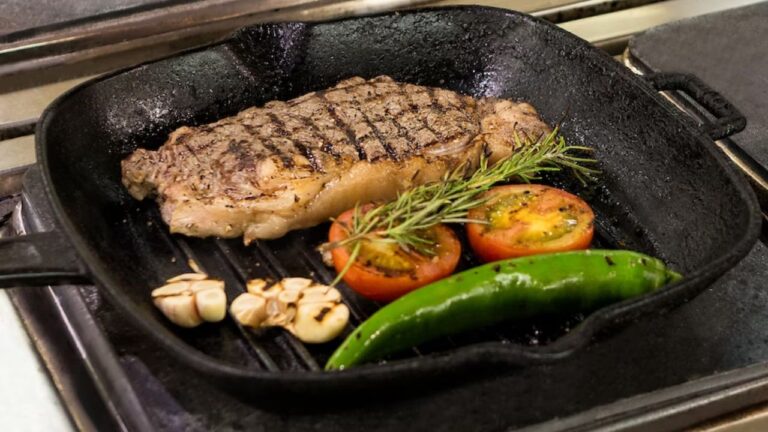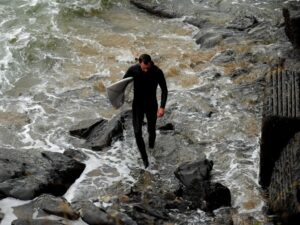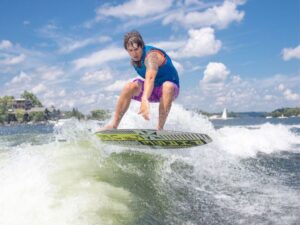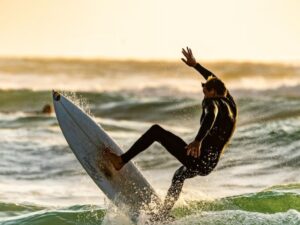Welcome to my article on the age-old debate of whether or not to surf on an empty stomach. You guys might’ve already heard different opinions on this topic.
Some people swear by surfing on an empty stomach, while others prefer fueling up before hitting the waves. But which side is correct? Let’s dig in.
If you have been reading my articles, you know I constantly say that surfing is an intense physical activity. You need strength, agility, and endurance to catch and ride waves. And one crucial aspect of preparation is fueling up with the right nutrients.
Generally, surfers should eat before surfing and not ride the waves on an empty stomach. That way, you have enough energy and stamina to perform well and avoid dizziness or fainting. Although, some experienced surfers prefer to surf on an empty stomach to improve digestion and increase fat-burn rate.
1. Pros of Surfing on an Empty Stomach
I. Improved Digestion: There is less food in the stomach that can cause discomfort or nausea while in the water.
II. Increased Energy: When you eat, blood is diverted to the digestive system to aid in the breakdown of food. Surfing on an empty stomach allows more blood flow to your muscles, leading to increased energy and better performance.
III. Better Mental Clarity: Eating a large meal before surfing can cause drowsiness and reduced focus. Surfing on an empty stomach can improve mental clarity and focus, allowing for better decision-making while in the water.
IV. Increased Fat-burning Potential: Your body has to rely on stored energy reserves, such as glycogen and fat, to fuel your muscles. This is especially good if you want to lose weight or improve your fitness.
Fasting before surfing can also help regulate insulin levels, reducing inflammation and improving insulin sensitivity.
2. Cons of Surfing on an Empty Stomach
I. Increased Risk of Hypoglycemia: This is a condition where blood sugar levels drop too low, causing dizziness, weakness, and fatigue. Surfing on an empty stomach can increase the risk of hypoglycemia, especially for those with low blood sugar levels.
II. Reduced Stamina: It can reduce stamina and cause muscle fatigue, making it more difficult to catch waves and perform at your best.
III. Increased Risk of Injury: Without proper nutrition, the body may not have the energy and nutrients needed to recover from injuries sustained while surfing. Surfing on an empty stomach can increase the risk of injury and prolong recovery.

3. What should you eat before surfing?
If you’re planning a day of surfing, you want to ensure you have the energy and endurance to catch those waves. What you eat before hitting the water can make a big difference in your performance and feelings.
Eating a balanced meal containing carbohydrates, protein, and healthy fats about 2-3 hours before surfing is best. Good options include oatmeal with fruit and nuts, a protein powder smoothie, or a turkey and avocado sandwich.
Good pre-surf meals should include complex carbohydrates, lean protein, and healthy fats. Some pre-surf foods include oatmeal with fruit and nuts, a turkey and avocado sandwich on whole grain bread, or a smoothie with Greek yogurt, fruit, and spinach.
I. Complex Carbohydrates to Sustain Energy
Complex carbohydrates are the best source of sustained energy for surfing. These include foods like whole grains, fruits, and vegetables.
Some good examples of complex carbohydrates to eat before surfing include:
- Oatmeal with fruit and nuts
- Whole grain toast with almond butter and banana
- Brown rice with grilled chicken and vegetables
- Quinoa salad with roasted vegetables and chickpeas
II. Lean Protein to Fuel Muscle
Protein is essential for building and repairing muscle tissue. It’s also important for providing energy, particularly for longer surf sessions. Good sources of lean protein include:
- Grilled chicken or fish
- Turkey or ham slices
- Greek yogurt or cottage cheese
- Tofu or tempeh
III. Healthy Fats for Energy & Satiety
While complex carbohydrates and lean protein should make up the bulk of your pre-surf meal, healthy fats can also be beneficial. Fats provide energy and can help you feel fuller for longer.
Good sources of healthy fats include:
- Avocado
- Nuts and seeds
- Olive oil
- Fatty fish like salmon or tuna

IV. Foods to Avoid Before Surfing
Some foods can cause indigestion or bloating, which can be uncomfortable when you’re out in the water. Others can cause a sudden energy crash, leaving you feeling depleted before your session.
Here are some foods to avoid before surfing:
- Greasy or heavy foods like burgers, pizza, or fried chicken
- Sugary foods like candy, donuts, or soda
- High-fiber foods, like beans or broccoli, can cause gas or bloating
4. Tips for Surfing on an Empty Stomach
Surfing on an empty stomach can be a tricky endeavor. While there are some benefits, the drawbacks can make it difficult to catch waves and enjoy the experience.
Fortunately, some tips can help both experienced and beginners navigate the world of surfing on an empty stomach.
- Hydrate: Drinking plenty of water before and during your surf session can help prevent dehydration and improve performance.
- Snack: If you decide to surf on an empty stomach, consider bringing a small snack, such as a banana or energy bar, to eat before or during your session. Good pre-surf snacks include a banana, a handful of nuts, or a small smoothie made with fruit and yogurt.
- Listen to Your Body: Pay attention to how you feel while surfing on an empty stomach. If you feel dizzy, weak, or fatigued, take a break and refuel.
- Go Surf in the Morning: It’s when your body is naturally fast, which means it’s more efficient at burning fat for fuel. Surfing in the morning also allows you to avoid the hottest part of the day, which can be draining and dehydrating.
- Take Frequent Breaks: It’ll help you avoid getting too tired or dizzy and allow you to rest and recover between sets.
- Avoid Strenuous Activity: Surfing can cause your blood sugar levels to drop, making you feel weak or dizzy. If you’re not used to surfing on an empty stomach, it’s best to take it easy and go at your own pace.
- Talk to Your Doctor: If you have health concerns, consult your doctor or nutritionist before you start surfing on an empty stomach. They can help you determine and give you tips on how to do it safely.
5. What do surfers eat after surfing?
So, you’ve just spent hours catching waves, feeling the sun on your skin and the salty breeze in your hair. Now, it’s time to refuel your body and replenish the energy you spent during your surf session.
Some good post-surf meal options include grilled chicken or fish with a side of quinoa and vegetables, a veggie and hummus wrap, or a salmon and avocado salad. Smoothie bowls with fruits, protein powder, and healthy fats are also tasty and nutritious.
Eating within an hour after surfing gives your body the best chance to recover. However, listen to your body and eat what feels right for you. Everyone’s nutritional needs differ, so experiment with different foods and see what works best.
Here are some tips on what to eat after surfing:
I. Hydrate
First and foremost, it’s essential to hydrate your body. Drink plenty of water to replace fluids lost through sweat and to help your muscles recover faster.
You can also drink coconut water or sports drinks that contain electrolytes to replenish the minerals lost during your surf session.
II. Protein
Protein is crucial for muscle recovery and growth. After surfing, your muscles will be fatigued, and protein can help repair any damage.
Protein sources include chicken, fish, tofu, lentils, and beans. A protein shake with added fruits and vegetables is also a great option.

III. Carbohydrates
Carbohydrates are a great energy source, and they help replenish the glycogen stores in your muscles that you depleted while surfing.
Opt for complex carbohydrates like whole-grain bread, pasta, rice, or quinoa.
IV. Fruits and Vegetables
Fruits and vegetables are rich in vitamins, minerals, and antioxidants, which can help reduce inflammation and speed up your recovery.
Plus, they’re a great way to add fiber to your meal. So, remember to add some greens to your plate, like kale, spinach, broccoli, or asparagus.
V. Healthy Fats
Healthy fats like omega-3 fatty acids reduce inflammation and aid muscle recovery. Sources of healthy fats include nuts, seeds, avocados, and fatty fish like salmon or tuna.
6. Conclusion
Choosing to eat or not before surfing ultimately depends on your preferences and health needs. If you decide to eat before surfing, choosing easily digestible foods that provide sustained energy, such as complex carbohydrates and lean protein, is important.
Eating heavy or greasy foods, or consuming too much sugar, can cause indigestion and energy crashes. Beginners or those with health concerns should consult a doctor or nutritionist to determine the best pre-surf nutrition plan for their needs.
Expert QnA
Q. Is it safe to surf on an empty stomach?
Surfing on an empty stomach is generally safe, but listening to your body and knowing your limits are important. If you feel weak or dizzy, it’s best to get out of the water and refuel.
Q. Can surfing on an empty stomach affect my performance?
Technically, surfing on an empty stomach can affect your performance. With the proper nutrition, your body may have enough energy to sustain the physical demands of surfing, leading to fatigue and decreased performance.
Q. How long should I wait after eating before surfing?
It’s recommended to wait at least 1-2 hours after eating a full meal before surfing. This allows enough time for digestion and prevents discomfort or nausea in the water.
Q. Can I eat a snack before surfing?
Eating a small snack before surfing is okay if you’re hungry. Good options include a banana, an energy bar, or a handful of nuts. Just give yourself enough time to digest before hitting the water.
Q. What should I do if I feel hungry while surfing?
If you feel hungry while surfing, it’s best to take a break and refuel with a snack. Good options include a sports drink, an energy bar, or a piece of fruit. Just make sure to avoid eating too much or too quickly, as this can lead to discomfort in the water.





